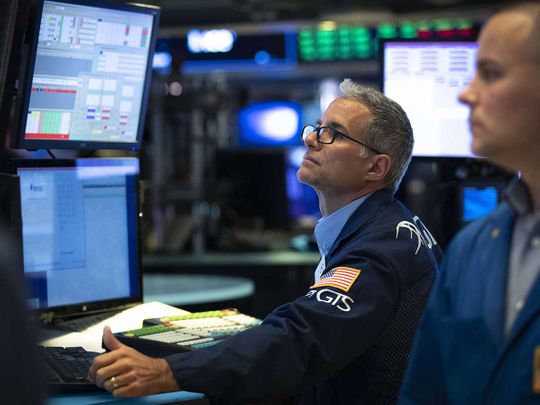
Dubai: Global investors may have up until now been unfazed by a raft of poor economic data, briefly assuming that the worst was priced in and all that was left was to cash-in on a speedy rebound.
But a sobering warning from the World Health Organization that the coronavirus may never go away and signals that top central banks may have hit the bottom with interest rates, and investors were back in panic mode.
Dreading a second wave of infections
As economies slowly reopen after months of lockdown, investors are now dreading a possible second wave of infections, which only further fuels worries on whether the world economy will reel in a much deeper recession or yet another depression.
“Looking at macro data over the last two weeks or so, one cannot help wonder, if the end is not nigh after all,” said Stéphane Barbier de la Serre, macro strategist at Makor Capital Markets.
“One can certainly not rule out the possibility that what is looming ahead for the global economy is not merely a violent recession but much rather a fully-fledged depression.”
Deep recession or another depression?
US Federal Reserve Chair Jerome Powell had this week warned of a recession worse than any since World War Two, while suggesting that the Fed’s firepower may not be sufficient to avert deep damage, spooking markets soon after.
“It may alternatively be that the narrative currently best describing global macro is not recession or depression per se but rather suspension,” Barbier de la Serre added, meaning that it could probably be that the global economy has been “furloughed”.
Have markets already priced in the worst?
“While there will be no such thing as certainty from a COVID-19 perspective for a few months at least, what consensus is implicitly – if not explicitly – pricing at this stage is a scenario whereby lockdowns will progressively fade out but only to be enforced again whenever the notorious second-wave strikes.”
The consensus is objectively some kind of worst-case scenario, Barbier de la Serre said, while adding that while it does not mean that it may not happen, by rule of thumb however, worst-case scenarios rarely materialize when they incarnate consensus.
“Even if the above consensus worst-case scenario does happen, why should macro and risk assets be materially impacted? – All that is already priced-in, implicitly... As far as risk assets are concerned, this is less the beginning of the end than be end of the beginning.”
Earnings paint dreary picture
A slew of companies around the world, including Lyft, Apple, AirFrance-KLM and PepsiCo, have withdrawn their earnings guidance amid ongoing uncertainty caused by the pandemic. Only around one in five companies listed on the S&P 500 are still providing quarterly guidance.
Financial markets have been on a roller coaster ride since the coronavirus crisis took hold. In the US, stock markets saw their worst first quarter on record as Covid-19 became a worldwide pandemic, but shares rallied in April amid hopes for a treatment and a leveling out of new cases. A similar pattern was seen in European markets.
However, stocks around the world took a downward turn on Thursday after Federal Reserve Chairman Jerome Powell gave a stark warning that the economy was still facing significant risks related to the outbreak.
Analysts take on a bleak stance
Global stock markets have been bolstered in recent months by massive cash injections from governments and central banks.
However, many analysts took to a negative stance saying they didn’t believe the additional liquidity would do anything more than prop up the banking sector, while adding that it would not facilitate the recovery markets are anticipating.
The International Monetary Fund had warned that the global economy is set for the deepest recession since the 1930s as a result of the coronavirus crisis, with worldwide gross domestic product (GDP) expected to contract 3 per cent this year.








